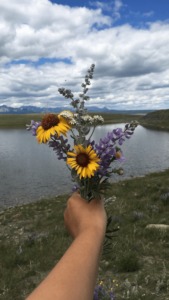
I heave myself up what seems like our millionth hill as sweat droplets fall down my face and 20 mph crosswinds try to shove me off the shoulder of the road. At this point, four hundred out of seven hundred miles on my bicycle seemed like enough to me. Learning about energy and climate change in Montana’s beautiful landscape was a great way to con me into doing something so crazy. Although at that point in my ride, I was fully regretting my decision to get on a bicycle that day, we pushed through and got to Augusta in one piece, and I have to admit I was pretty pleased with myself for getting through it.
Each day has its own difficulties, uphill’s causing a break in my mental strength, while the downhill’s make me forget all the pain I had endured only seconds ago. Studying the environment seems to go something along the same lines: days of doom and gloom, followed by days of inspiration and optimism. In conversation, I love to spew my guts out about my love for the beauty of the Earth, despite my struggles with coming to terms with those who could care less about how long a disposable water bottle will stay in a landfill. In this course, we’ve come into contact with many different types of people that react in a variety of ways to our explanation of riding our bicycles seven hundred miles through Montana. These various reactions make me more intrigued about how to convey my love for this land without getting pushed to the side and getting called a “hippie.”
In trying to reach audiences and communicating our hardships around a changing climate, we must be conscious, put a little heart in it, and realize that a complex problem cannot be solved with a simple answer. The rhetoric around climate change is about as complex as the issue itself, which is why it is so important to explore the best ways to reach vast audiences while telling the truth and implementing hope.
As an English student, I am deeply intrigued by the way vocabulary is able to affect groups of people. The way we talk about something may influence the way our audience thinks about the subject. Throughout this course, we’ve had the pleasure of listening to many different people with a variety of backgrounds and perspectives, but a common thread I have seen is the importance of advocating for the beauty of the land in order to get people to care.
While staying in Augusta, a small town of about 300, we were able to speak with Hal Herring. Upon meeting Hal, I was skeptical about the mixed views he identified with, but I was intrigued and amazed by his ability to bridge so many different types of people together and his ability to defy stereotypes. Hal is a full-on lover of nature and the wilderness, and fights hard for public lands, voicing this through his journalism for the magazine, Field and Stream, among others. While he spoke, he explained his reluctance to communicate heavily about the negatives and instead tries to “expose the atrocities” and “celebrate the beauties.” He talked about the land and what he loved about it. His tone was excited and proud to be a part of it all.
Hal advocates for intact ecosystems, clean water, and preserved public lands because he loves to hunt and fish. Hal is surrounded by people of all types, but especially outdoorsmen and women. He explained the struggle he has of loving the sport while simultaneously being an advocate of public land preservation, as well as the difficulties that come along with communicating to this audience because of the stigma around these identities. This stigma is heavily rooted in the way people identify themselves politically. We notice a stereotype in sportsmen and women as people who push out the ‘environmentalist’ identity due to the political labels to which they are attached. What Hal wants to do is to bring awareness to these individuals, showing them that they already are stewards of the land, because without preserving the land, keeping the waters clean and the ecosystems intact, there will be no animals to hunt or fish to catch.
Being from Wisconsin, I am surrounded by fishermen and hunters. I often times find myself biting my own tongue when conversing with these people because of the fear of being rejected due to my environmentalist views. In thinking about my struggle in this, an article titled about “The Power of Moral Affirmation” came to mind. The author wrote, “My neighbor is a practical man. ‘Look’, he says to me, ‘if you want to call people to action on climate change, talk to them about what moves people to action– self-interest, money, and fear.’” Hunters, fishermen, and myself all care about the land. It may be in differing ways, but we all enjoy and love it in the way we know how. Being an advocate for the land may be hard, but we all use and care for it in our daily lives, one way or another. These conversations of conflict about the care and future of the land may be difficult, but why are we fighting over the reasons we care rather than fighting for the land so we can all continue to love it? Because these identities are so political, we are faced with a battle on how to break down these stigmas and show the common ground of loving the environment, for whatever that reason may be.
2 Replies to “Livi Hackbarth: Those Dang Hippies and Their “Environmentalism””
Comments are closed.
Livi your words are always awe inspiring! Keep chasing that dream girl!
I love these words, our land, and you!